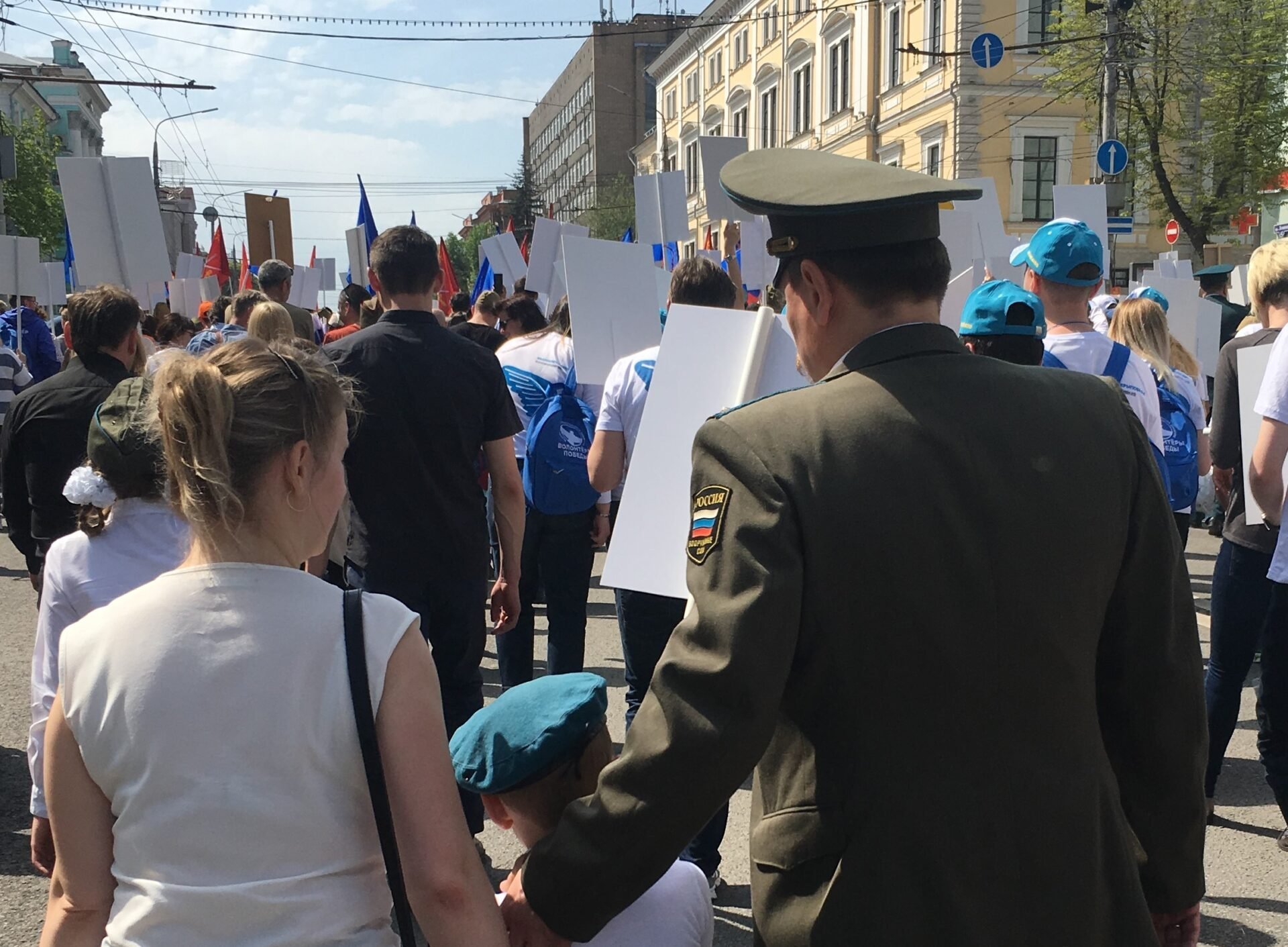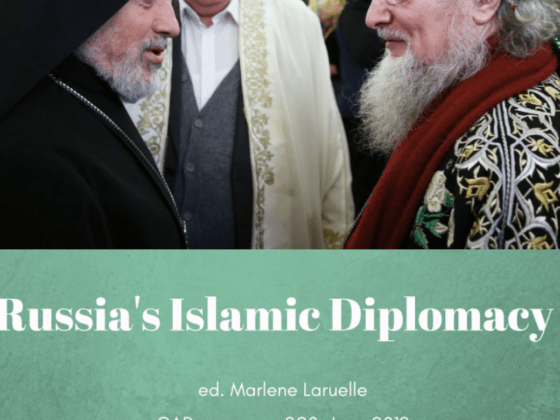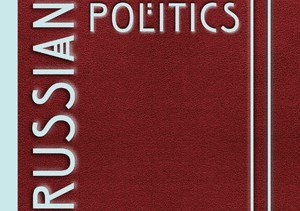For several years, Russia’s World War II remembrance policy has been widely discussed and challenged by some of the neighboring countries, while Moscow has reinforced the pompousness of the event at home. In May 2020, Russia’s commemorations will culminate in the 75th anniversary of Victory Day. This year, a new step was taken by increasing the international face of the commemoration, with over 100 international volunteers from around 40 nations and territories who convened in Moscow and then in Tula. As the sole invitee from the United States, I observed two new developments in the Russian war narrative and will discuss how this new Russian memory policy could potentially help improve U.S.-Russian public diplomacy.
The Tula Immortal Regiment
New Developments: Internationalization & Expansion
Unlike the Immortal Regiments that marched in more than twenty American cities this year, the “Volunteers of Victory,” which mobilize commemorative efforts in Russia and now abroad, could not exist without Russian government patronage. The movement itself is under the control of Rosmolodezh, the federal youth agency, and its patriotic education division, Rospatriotcentr. The Presidential Grants Foundation and the Government of Tula Oblast sponsored the 74th-anniversary convention by covering the costs of t-shirts, airfare, and a flashy closing ceremony at Tula’s “Oktava” industrial cluster.
Until now, May 9th events in the United States have primarily been the initiative of local citizens with Russian backgrounds, such as Yekaterina Hill who lives in Washington, D.C. I volunteered with her in 2018, and I saw how hard she worked to prepare veterans’ portraits at her suburban home on the eve of the Immortal Regiment. I also noticed her decision to discourage portraits of Stalin, hammers and sickles, or national flags from joining the procession, a wise move to try to prevent political spats on what is seen by many Soviet veterans’ descendants as a sacred day.
The “Volunteers of Victory” are now expanding from the Russian Federation. In early June, its Moscow headquarters began selecting “international coordinators” in foreign countries to organize remembrance activities, many of whom are returning “Ambassadors of Victory” (delegates to Tula who convened from other countries).
In addition to expanding across the globe, the “Volunteers of Victory” are now extending their mission across the calendar. One of this organization’s hashtags on social media is #NotOnlyMay9th, referencing the year-round activities its “Victory Ambassadors” plan to do: interviewing Soviet veterans living abroad and uploading the videos to YouTube, caring for Red Army monuments overseas, designing interactive “quests” in attempts to teach history innovatively, and many other activities. Some of the convention’s graduates went into action on June 22 to help organize “Candle of Memory” demonstrations on the anniversary of the Nazi invasion.
The purpose of this growing initiative is to interest young people in learning more about World War II through a kinesthetic learning process. For instance, in June 2019, a quest with the theme “1944: Children of War” took place. It proposed that children roleplay underage partisans, blowing up bridges made of matchboxes and making telephones out of strings and cups. While this initiative was eyebrow-raising for some delegates, it was a breath of fresh air for not being solely linked to the “Great Patriotic Victory” but meant to immerse the participant in the everyday lives of Soviet people throughout the war. This policy entails a breakout from May by which Immortal Regiments and the handout of St. George’s ribbons have been so far confined.
The subject of World War II remembrance is now poised to become a topic of debate throughout the year. War history has become even more of a daily occurrence—a serious concern for all those denouncing rising everyday militarism in Russia, such as the simple controversies of dressing toddlers in military uniforms to the nationalist rhetoric of “we can repeat it”—a reference to the fact that Russia is ready to be at war once again.
But maybe the initiative should discuss broader topics of warfare? Not only on the May 9 Victory Day, but it could be used as a window of opportunity for officials and private citizens in the United States and Russia who wish to use the collective history of WWII as a public diplomacy bridge.
Let’s examine two implications of the Russian memory strategy of internationalization and Expansion for U.S.-Russian Relations.
Tula Soldier’s Family Amid Volunteers
Perception of Russian Soft Power and Reactions to It
Émigré Russian oppositionists have criticized the Immortal Regiments in the United States as examples of “co-opted independent NGOs” serving the Kremlin’s interests. If Rosmolodezh and Rospatriotcentr now become involved—financially or through issuing orders to U.S.-based compatriots—criticism of Regiments will increase dramatically. Today’s real grassroots demonstration could morph into a projection of Moscow’s intents. Many immigrants from the former USSR support the idea of honoring their heroic relatives, but fewer want to do so hand-in-hand with the Russian Federation, and even less with the Kremlin.
There are also potential legal issues. In 2018, the organizer of the Immortal Regiment in Seattle, Sergey Gladysh, told Sputnik that the FBI questioned the regiment in the lead-up to the Russian Consulate’s closure there. While he was not suspected of being a foreign agent, this equation could change if the Russian government becomes more involved.
In such a scenario, the “Volunteers of Victory” could be perceived as a vehicle for inserting Russia’s official historical narrative in more than forty foreign countries and as part of Russia’s hybrid media warfare. However, it doesn’t have to be that way.
MP Natalia Pilyus at the “Oktava” Closing Ceremony
Genuine Cultural Exchange and Public Diplomacy Bridge
The “Victory Ambassadors” reasonable interest in raising awareness of the USSR’s decisive role in crushing Nazi Germany—despite Soviet complicity during the Ribbentrop-Molotov Pact and its long-term impact on, for instance, the Baltic states—is shared by respected Western historians. The “Volunteers of Victory” also deserve recognition for the number of intelligent young people that they have inspired. Even President Vladimir Putin’s political opposition abroad, like the Free Russia Foundation, recognize that Rosmolodezh and other federal youth projects can be considered stepping stones for future political leaders and aspiring elites. Why not take advantage of this platform and foster new contacts between students? Most young Russians I spoke with are fascinated by Russian clubs in American colleges such as mine at George Mason University. U.S. and Russian professors and students could link their universities through webinars, roundtable discussions, essay contests, and as visitors at official commemoration events.
Americans ought to see how an Immortal Regiment is organized in a city like Tula, where around 150,000 out of a population of less than half a million joined the march. Likewise, Russians should check out the National Memorial Day Parade in Washington, D.C., which includes a “March of Heroes”–Americans carrying portraits of (nonrelative) World War II veterans. The similarity between both events would be worth exploring, and some joint activities could be envisioned.
The Soviet contribution to winning World War II should continue to be known to U.S. citizens. Indeed, U.S. diplomats and military officers already make such acknowledgments in the annual “Spirit of the Elbe” event. On the anniversary of the Soviet-American link-up on the Elbe River in Germany, the U.S. Embassy in Moscow and the Russian Embassy in Washington hold joint ceremonies. Even in the middle of the current tensions, 2019 was no exception, although Victory Day 2010, the year when U.S. Army soldiers (including a Soviet soldier’s descendant) marched on Red Square, does not seem repeatable so far in such a context.
It would be in the interest of both the United States and Russia to develop joint activities around World War II commemorations and use the “Volunteers of Victory” and Immortal Regiment initiatives to re-establish a cultural dialogue by investing in reducing tensions and disproving of nationalist myths of Russophobia in the West.
To make the second scenario a reality, participants on both sides should agree that being grateful for the Soviet Union’s sacrifices does not mean absolving Stalin’s government of its crimes against humanity. The “Volunteers of Victory” ought to make clear that honoring Red Army veterans that fought for their families’ existence and memorializing the victims of Soviet oppression are not mutually exclusive.
Alexander Naumov is an undergraduate student at George Mason University studying international politics and Russian and Eurasian studies. The views and opinions in this article do not express those of the “Volunteers of Victory” or any other organization.











